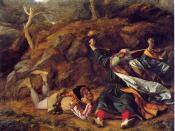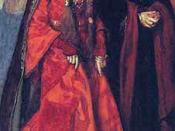Like many villains in Jacobean drama, Edmund seethes with frustration about the 'plague of custom' (Act 1 Scene 2) that keeps him on the fringes of society. His Machiavellian qualities include his political ambition and willingness to use unscrupulous methods to achieve his aims. The theme of appearance and reality prevails through Edmunds character. We see him as courteous to his father, even loyal, but through his soliloquy's we discover the real Edmund and his ulterior motives to the treatment of his father and others. As Edmund says himself, he is adaptable and ready to manipulate events to serve his turn; "all with me's meet that I can fashion fit" (Act 1 Scene 2) His ability to adopt the right tone in any situation helps him in his progress towards power.
Edmund seems to subscribe to a savage code: survival of the fittest. His goddess, nature, is a brutal, anarchic force.
Edmund never apologises for his wickedness; he revels in it right up to the final scene. He rejects hierarchy, but his own ambitions are worldly; really, he wants to succeed in society's terms. He aims first at Edgar's inheritance, then at the title of Earl of Gloucester and finally at the throne of England.
Yet Edmund is subversive. The alacrity of his rise is an indication of this. He is very successful in Goneril and Regan's evil world, he is ultimately responsible for the death of three princesses, as well as for the cruel maiming of his father. His progress is halted to late to save Lear. By the end of the final scene Emund has proved himself to be formidably destructive. He almost obtains everything he wants.
However, we come to loath everything Edmund stands for. We may admire his tenacity, intelligence and quick wits, enjoy...


